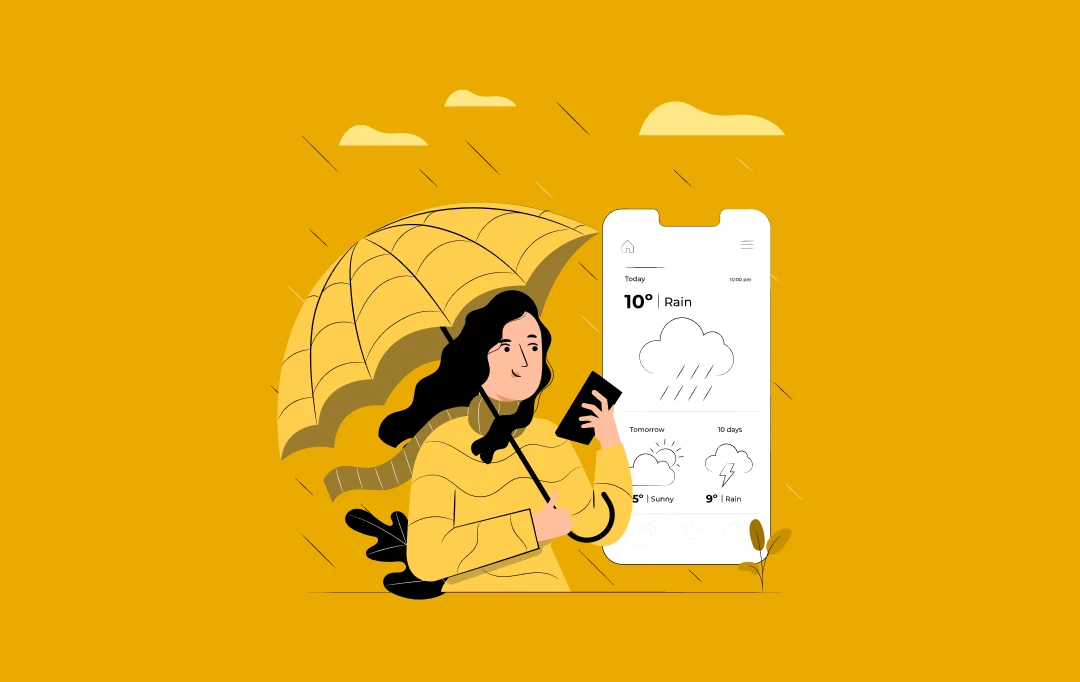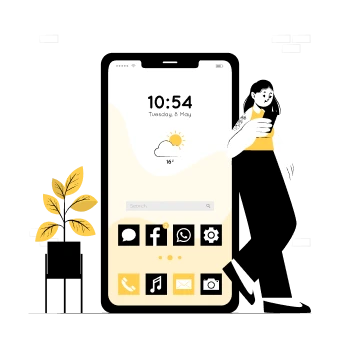- WillyWeather – Setting the Bar High in the Weather Forecasts
- A Comprehensive Analysis of WillyWeather-like App Development Cost
- Cost Breakdown by Complexity Levels
- Cost Breakdown by Development Stages
- How to Estimate Weather App Development Costs?
- Factors Influencing the Cost of App Development like WillyWeather
- UI/UX Design
- Backend Development
- Third-Party Integrations
- Security Measures
- Compliance Requirements
- Platform Selection
- Technology Stack
- Complexity of Features
- Hidden Elements Influencing WillyWeather-like App Development Cost
- App Maintenance
- App Hosting
- App Marketing
- Legal and Licensing Fee
- How to Optimize Weather App Development Costs?
- How Do Weather Apps like WillyWeather Make Money?
- Strategic Steps Involved in the Weather App Development Process
- Planning and Research
- Business Strategy
- UI/UX Design
- App Development
- Testing and Quality Assurance
- Deployment and Launch
- Post-Launch Support
- How to Outperform Popular Weather Apps Like WillyWeather
- 1. Offer Hyper-Personalized Forecasts
- 2. Enhance User Experience with Intuitive UI/UX
- 3. Integrate Advanced Features
- Build a Most Accurate Weather App with Appinventiv
- FAQs
According to Statista, the revenue in the global weather app market is expected to soar from $1.54 billion in 2022 to $3.28 billion by 2029, growing at a CAGR of 8.54% from 2022 to 2029. That is because people rely on weather apps like WillyWeather for real-time weather updates more than ever.
WillyWeather, with over a million downloads on Google Play and the Apple App Store, attracts 1 million+ active monthly users. With its extensive user base, the app generates billions in annual revenue, establishing its position as an industry leader and contributing to the booming weather app industry.
Whether planning a trip, scheduling outdoor events, or just deciding what to wear, we all use these apps to plan our lifestyle.
This increasing reliance on weather apps presents a lucrative opportunity for entrepreneurs to invest in weather forecast app development and tap into its expanding user base.
However, developing a feature-rich weather app like WillyWeather requires significant investment. On average, the cost to build a weather app like willyweather ranges from AUD 60,000–600,000+ ($40,000 to $400,000) or more.
From integrating real-time data sources to designing an intuitive UI, the costs can vary widely based on several critical components. While this range might seem steep initially, understanding the key cost drivers and adopting a strategic development approach can help you optimize the WillyWeather-like app development cost.
Let’s break it all down so you can get a clear picture of what goes into building a top-tier weather app.
Discuss your project requirements with us and get a more precise cost estimate.
WillyWeather – Setting the Bar High in the Weather Forecasts
WillyWeather is not just another best Australian weather app; it is a powerhouse in weather prediction, serving users across Australia, the UK, and the US. It goes far beyond basic temperature updates, offering interactive radar maps, tide charts, UV indexes, and hyper-local forecasts to keep users informed with real-time, location-specific insights.
Whether tracking storm movements, monitoring coastal conditions, or planning outdoor activities, WillyWeather ensures users can access real-time, accurate, and visually engaging data.
With millions of active users and over a million downloads on Google Play, WillyWeather has established itself as an industry leader, generating billions in annual revenue.
What truly sets it apart is its advanced nowcasting model, which pulls in real-time data from 70 radars across Australia to predict rain and small-scale storms with exceptional precision. This makes it an essential tool for outdoor enthusiasts, sailors, and professionals who rely on highly accurate forecasts. With its seamless interface and cutting-edge features, WillyWeather continues to push the boundaries of weather forecasting technology.
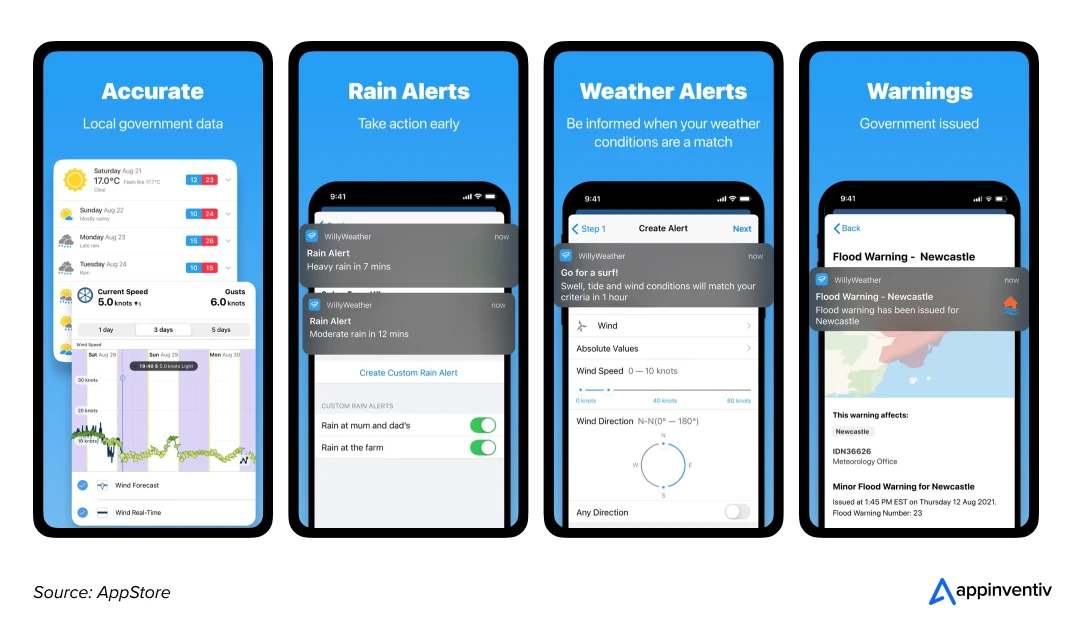
A Comprehensive Analysis of WillyWeather-like App Development Cost
The cost to build a weather app like willyweather typically relies on three core components: app complexity levels, development stages, and timeline. Understanding these vital elements in depth will help you estimate the overall budget and make strategic decisions for cost optimization.
Cost Breakdown by Complexity Levels
The complexity of your weather app significantly impacts development costs. A basic app with standard weather updates costs comparatively less than an advanced app with AI-driven nowcasting and real-time alerts.
| Complexity Level | WillyWeather-like app features | Estimated Costs | Estimate Timeline |
|---|---|---|---|
| Basic App | Standard weather updates, simple UI | AUD 60,000 – 122,000 | 4 – 6 months |
| Moderate Complex App | Radar maps, tide charts, UV index | AUD 122,000 – 305,000 | 6 – 9 months |
| Advanced App | AI-based nowcasting, real-time alerts | AUD 305,000 – 600,000+ | 9 months – 1 year or more |
Cost Breakdown by Development Stages
Making a weather app like willyweather is a complex and challenging process that involves several steps. Each step significantly contributes to the total budget. Thus, before you set a budget for weather app development, explore the stage that brings your app idea to life.
| Development Stage | Key Actions | Estimated Costs (AUD) | Estimated Costs (USD) |
|---|---|---|---|
| Planning & Research |
| AUD 3,000 – 30,000 | 2,000 – 20,000 |
| UI/UX Design |
| AUD 7,500 – 60,000 | 5,000 – 40,000 |
| Development |
| AUD 30,000 – 300,000+ | 20,000 – 200,000+ |
| Testing & Deployment |
| AUD 4,500 – 30,000 | 3,000 – 20,000 |
| Post-Launch Maintenance |
| AUD 7,500 – 30,000/year | 5,000 – 20,000/year |
How to Estimate Weather App Development Costs?
There is a simple formula to calculate the overall cost to develop a weather app like WillyWeather. All you need to do is to multiply the total development hours by the developers’ hourly rates, and you will get the actual cost of app development.
For example, if a development team in Australia charges AUD 60/hour ($40/hour) and the project takes 2,500 hours, the cost would be AUD 150,000 ($100,000), excluding post-launch maintenance and updates.
| AUD 60/hour ($40/hour) x 2,500 hours = AUD 150,000 ($100,000) |
|---|
Factors Influencing the Cost of App Development like WillyWeather
Developing a most accurate weather app like WillyWeather involves multiple factors that impact the overall cost. From UI/UX design and backend development to third-party integrations and compliance, each element plays a crucial role in determining the budget. Here is a detailed breakdown of the key factors influencing the cost of developing a weather app.
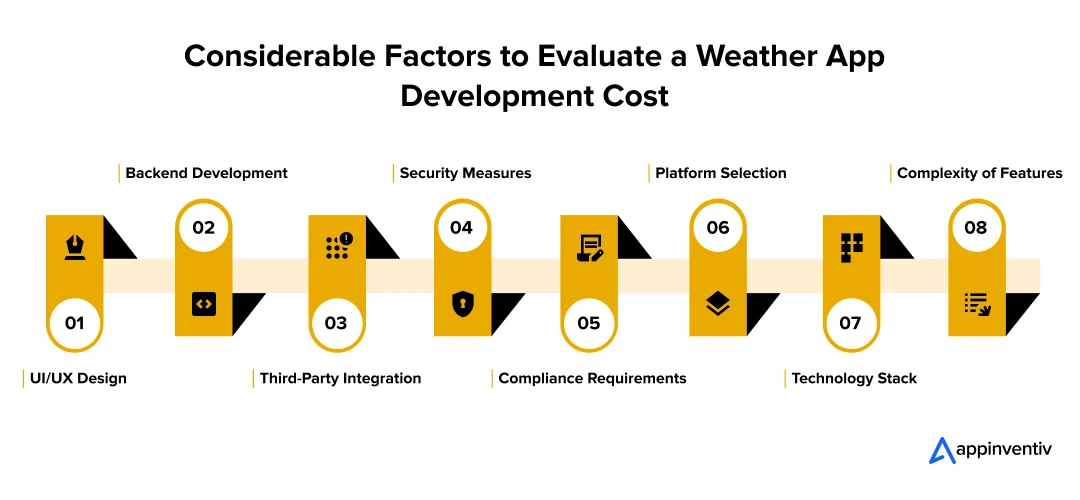
UI/UX Design
A well-designed weather app is not just about looking good; it is about making sure users can access critical weather data effortlessly. Smooth navigation, intuitive design, and visually appealing elements enhance user engagement but also add to the cost.
Cost Breakdown for UI/UX Design
| UI/UX Design | Estimated Cost (AUD) | Estimated Cost (USD) |
|---|---|---|
| Basic UI/UX | 7,500 – 15,000 | 5,000 – 10,000 |
| Advanced UI with animations | 15,000 – 60,000 | 10,000 – 40,000 |
Backend Development
The backend handles API integrations, data storage, and user management. The more complex your app, the stronger the backend infrastructure needs to be, which directly affects development costs.
Cost Breakdown for Backend Development
| Backend Complexity | Estimated Cost (AUD) | Estimated Cost (USD) |
|---|---|---|
| Basic backend setup | 7,500 – 45,000 | 5,000 – 30,000 |
| Advanced backend (real-time data processing) | 45,000 –,000+ | 30,000 – 80,000+ |
Third-Party Integrations
Weather apps rely on external services like meteorological APIs, mapping tools, Geolocation services, and push notifications to provide real-time data. The cost of these integrations varies based on usage limits and the number of third-party services required.
Cost Breakdown for Third-Party Integrations
| Third-Party Integration | Estimated Cost (AUD) | Estimated Cost (USD) |
|---|---|---|
| Basic API Integration | 7,500 – 15,000 | 5,000 – 10,000 |
| Premium API Integration | 15,000 – 45,000 | 10,000 – 30,000+ |
Security Measures
With users relying on your app for real-time weather updates, ensuring data security is critical. Implementing security measures like data encryption techniques and secure APIs adds to the cost but is essential for protecting user data and maintaining trust.
Cost Breakdown for Security Implementation
| Security Implementation | Estimated Cost (AUD) | Estimated Cost (USD) |
|---|---|---|
| Basic security measures (SSL, data encryption) | 7,500 – 15,000 | 5,000 – 10,000 |
| Advanced security (DDoS protection) | 15,000 – 45,000+ | 10,000 – 30,000+ |
Compliance Requirements
Compliance is not optional; it is indispensable for all types of app development, and a weather app is no exception. These apps deal with location-based data; thus, adhering to data protection laws such as GDPR and CCPA is essential. These regulatory compliances ensure your app operates legally and avoids hefty fines but add to the development costs.
Cost Breakdown for Compliance Standards
| Compliance Level | Estimated Cost (AUD) | Estimated Cost (USD) |
|---|---|---|
| Basic compliance setup | 7,500 – 15,000 | 5,000 – 10,000 |
| Full compliance implementation | 15,000 – 460,000+ | 10,000 – 40,000+ |
Platform Selection
Deciding whether to build for iOS, Android, or both can greatly impact the cost to build a weather app like WillyWeather. Native apps provide top-notch performance and seamless user experience but come at a higher cost. On the other hand, cross-platform frameworks like Flutter or React Native can save money by using a single codebase.
Cost Breakdown by Platform
| Platform | Estimated Cost (AUD) | Estimated Cost (USD) |
|---|---|---|
| iOS App Development | 7,500 – 45,000 | 5,000 – 30,000 |
| Android App Development | 7,500 – 45,000 | 5,000 – 30,000 |
| Cross-Platform Development | 45,000 – 75,000 | 30,000 – 50,000 |
Technology Stack
Your app’s technology stack determines its performance, scalability, and security. Choosing the ideal tech stack increases initial development costs but ensures smooth operations in the long run.
Cost Breakdown by Technology Stack
| Technology Stack | Estimated Cost (AUD) | Estimated Cost (USD) |
|---|---|---|
| Basic stack (React, Node.js) | 7,500 – 45,000 | 5,000 – 30,000 |
| Advanced stack (Swift, Kotlin, AWS, AI) | 45,000 – 105,000 | 30,000 – 70,000+ |
Complexity of Features
The more advanced the features, the higher the development cost. Basic apps with limited functionalities focus on standard weather forecasts, while advanced and most accurate weather apps like WillyWeather integrate real-time radar maps, AI-driven predictions, and functionalities which increase cost.
Cost Breakdown by Feature Complexity
| Feature Type | Features | Estimated Cost (AUD) | Estimated Cost (USD) |
|---|---|---|---|
| Basic Features |
| 7,500 – 30,000 | 5,000 – 20,000 |
| Advanced Features |
| 30,000 – 60,000 | 20,000 – 40,000 |
| Complex Features |
| 60,000 – 90,000+ | 40,000 – 60,000+ |
Hidden Elements Influencing WillyWeather-like App Development Cost
While the upfront factors mentioned above are the most obvious expense, there are some hidden factors that can impact your budget, too. Post-launch aspects, like app maintenance, hosting marketing, etc., are as crucial as development. Though these hidden elements add to the overall expenses, they ensure that your weather app remains functional, secure, and visible to users. Overlooking these hidden costs can lead to performance issues or poor user adoption.
App Maintenance
Regular updates, bug fixes, and security patches are essential to keep the app running smoothly. App maintenance costs depend on the app’s complexity, server needs, and feature updates.
| App maintenance usually accounts for 15-20% of the initial development cost annually, translating to approximately AUD 15,000–AUD 90,000 ($10,000–$60,000) per year. |
|---|
App Hosting
Hosting costs depend on data storage, traffic, and cloud infrastructure requirements. A weather app with real-time data and high user engagement needs robust hosting solutions.
| App hosting costs depend on user volume and storage requirements, typically ranging from AUD 3,000– 19,000 ($2,000–12,500) per year. |
|---|
App Marketing
A well-built app is only successful if users know about it. Marketing strategies like ASO, paid ads, and influencer collaborations drive visibility and downloads.
| App marketing costs vary based on promotional strategies and user acquisition goals, typically ranging from AUD 15,000–76,000 ($10,000–50,000+) per year. |
|---|
Legal and Licensing Fee
Ensuring compliance with data protection laws, securing licenses for third-party APIs, and protecting trademarks involves legal audits, licensing fees, and expert consultations.
Depending on compliance requirements and third-party integrations, legal and licensing fees for developing a weather app can vary between AUD 10,000–100,000 ($6,500–$65,000+).
How to Optimize Weather App Development Costs?
Creating an app like WillyWeather requires significant investment, but the good news is that you don’t have to break the bank. With the right approach, you can optimize expenses while ensuring a seamless user experience and robust functionality. Strategic planning, smart feature selection, and choosing the right development model can make all the difference.
Let’s explore some effective cost-saving strategies that help keep development expenses under control without sacrificing quality:
| Cost-Saving Strategies | Impact on Development Costs |
|---|---|
| Build an MVP | Cuts initial development costs by 25-50% |
| Prioritize Essential Features | Reduces unnecessary expenses by 20-50% |
| Use Cross-Platform Development | Lowers costs by 20-40% |
| Outsource App Development | Saves 30-60% on hourly development rates |
How Do Weather Apps like WillyWeather Make Money?
Weather apps like WillyWeather generate revenue through multiple monetization strategies, turning free forecasts into a profitable business. From in-app purchases to premium subscriptions, these apps offer value-added services that keep users engaged while driving revenue. Interested in exploring various ways weather apps make money. Here is a table outlining the key monetization strategies for weather apps:
| Monetization Strategy | How It Works |
|---|---|
| Freemium Model | Offer basic features for free while asking users to pay for a subscription plan to access advanced features like ad removal, radar overlays, and hyper-local forecasts. |
| In-App Advertisements | Partner with third-party service providers and display banner ads, sponsored content, or video ads. You will generate revenue based on impressions or clicks. |
| Affiliate Marketing | Incorporate affiliate marketing strategies into the app and earn lucrative commissions for every successful product purchase |
| Data Licensing | Sells aggregated weather data to businesses, including airlines, logistics companies, and insurance firms. |
| White-Label Solutions | Licenses your application to other businesses or government agencies to create their own custom weather platform. |
Strategic Steps Involved in the Weather App Development Process
Creating an app like WillyWeather is a complex and challenging process that involves thorough planning of multiple steps and careful execution of the same. Each step is crucial in ensuring the app delivers accurate forecasts, seamless user experiences, and high performance. Let’s have a quick view at the essential steps involved in the weather app development process:
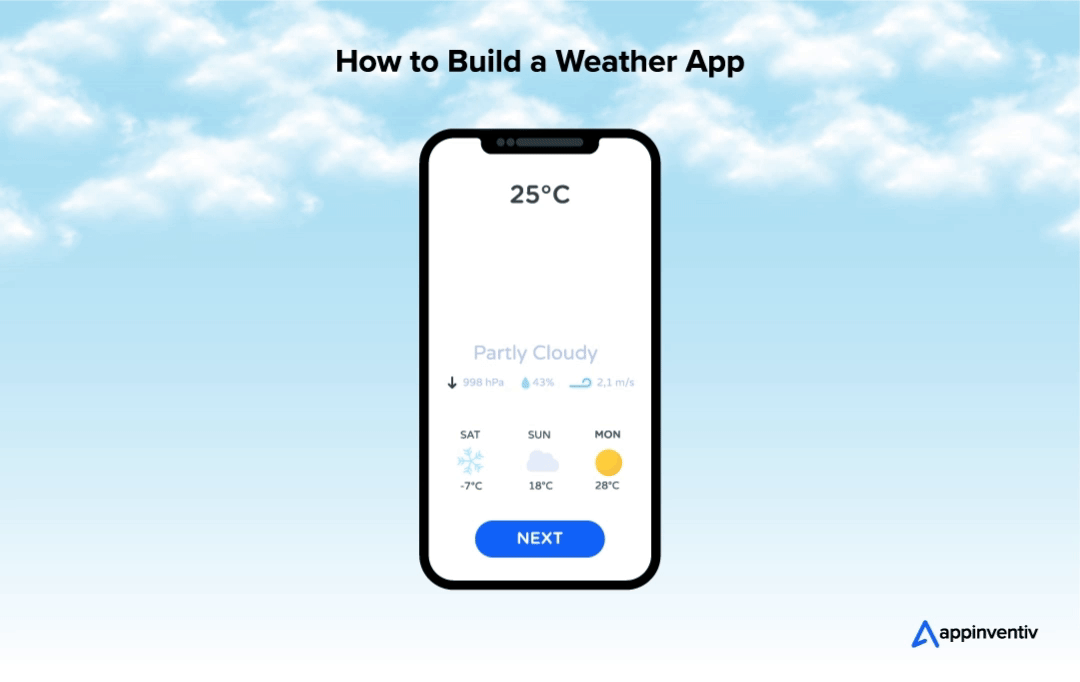
Planning and Research
A successful weather app development starts with thorough research and planning. This phase involves analyzing the target audience, studying competitors, defining key features, and selecting reliable weather data sources like APIs from BoM, OpenWeather, or AccuWeather.
Business Strategy
Outline a clear roadmap covering revenue models, estimated costs, compliance requirements, security protocols, and maintenance strategies. A well-structured plan ensures a smooth development process and sets the foundation for long-term growth.
UI/UX Design
Creating an intuitive and visually engaging UI/UX design is another vital step in app development that enhances user engagement and retention. The UI/UX phase includes wireframing, prototyping, and designing interactive elements to enhance user experience.
App Development
This is where the core functionality occurs, and your app idea comes to life. Development has three core action points:
- Frontend: Building an interactive user interface using technologies like Swift (iOS) or Kotlin (Android).
- Backend: Setting up servers, APIs, and databases to fetch real-time weather data.
- Integration: Implementing third-party APIs for weather forecasts, GPS location tracking, and push notifications.
Testing and Quality Assurance
After development, you must thoroughly test your app against various parameters to ensure it functions smoothly across different devices. This includes performance testing, security checks, and bug fixing to enhance stability and reliability.
Deployment and Launch
Once tested, your app is ready to be submitted to the Google Play and App Store. Proper app store optimization (ASO) ensures successful submission and better visibility, driving more downloads and user engagement.
Post-Launch Support
The work does not end at launch. Regular updates, security patches, and new feature enhancements are a continuous process. This ongoing phase is essential to keep the app competitive and enhance user experience over time.
Leverage AI, IoT, and big data for precise forecasts and a seamless user experience.
How to Outperform Popular Weather Apps Like WillyWeather
Beating a well-established weather app like WillyWeather requires more than just accurate forecasts. It is about delivering a superior user experience, innovative features, and seamless performance. By focusing on these key differentiators, you can truly leverage the benefits of developing a weather app like WillyWeather that stands out in the market and captures a loyal user base. Here is how:
1. Offer Hyper-Personalized Forecasts
Leverage artificial intelligence, machine learning, IoT, and other transforming technologies to provide ultra-localized weather predictions, custom alerts, and recommendations tailored to user preferences.
2. Enhance User Experience with Intuitive UI/UX
A clean layout, intuitive design, and easy navigation are the heart and soul of a successful app, driving retention and positive reviews. Thus, you must ensure a sleek, visually appealing interface with interactive maps, engaging animations, and smooth navigation.
3. Integrate Advanced Features
To outperform leading weather apps like WillyWeather, you must go beyond basic functionalities and integrate gamification elements, like weather prediction challenges and advanced features. This will enhance user engagement and provide deeper insights.
Here’s a comparison:
| Feature Category | Basic Weather App Features | Advanced Weather App Features |
|---|---|---|
| Weather Forecasting | Daily and hourly forecasts | AI-driven hyperlocal nowcasting and real-time microclimate tracking |
| Weather Alerts | Standard severe weather alerts | Personalized weather notifications based on user preferences |
| Maps and Visualization | Static weather maps | Interactive radar, satellite, and storm tracking maps with real-time overlays |
| Data Sources | Single-source weather data | Multi-source aggregation with AI-enhanced accuracy |
| Interactivity | Basic search and location selection | Crowdsourced weather reports, live user contributions, and community-driven insights |
| Additional Insights | Temperature, humidity, wind speed | Air quality index, pollen levels, wildfire, and UV index monitoring |
| Personalization | Default location and basic settings | AI-driven recommendations, activity-based weather insights, and historical weather trends |
| Integration and Connectivity | GPS-based location tracking | Wearable and IoT integration (smart home, car dashboards, etc.) |
Build a Most Accurate Weather App with Appinventiv
Building the best weather app in Australia like WillyWeather, requires a perfect blend of precise data, advanced technology, and an intuitive user experience. From real-time forecasting and interactive maps to AI-driven analytics and seamless integrations, every aspect plays a crucial role in delivering a reliable and engaging platform.
Of course, developing a high-performance app with such capability calls for the expert assistance of a reputed mobile app development company in Melbourne, Australia, known to bring complex app ideas to life with utmost precision. This is where we come in.
At Appinventiv, we specialize in building cutting-edge weather apps that leverage AI, IoT, and big data to provide hyper-accurate predictions and unmatched user experience. With a team of 1,600+ tech experts and a track record of delivering 3,000+ successful applications, we can help you develop a feature-rich weather app that stands out in the market.
Whether you just want to know the cost to build a weather app like WillyWeather or turn your app vision into a seamless reality, contact us today, and we will be happy to help you.
FAQs
Q. How much does it cost to develop a weather app like WillyWeather?
A. The cost of developing a weather app like WillyWeather varies depending on various factors like the app’s features, platform, third-party integrations, and the location of the app development company.
On average, the cost to build a weather app like WillyWeather ranges between AUD 60,000–600,000+ ($40,000–400,000+), with ongoing maintenance and updates adding to the overall expenses.
Q. How long does it take to make an app like WillyWeather?
A. The timeline for developing a weather app varies based on the app’s complexity, features set, tech stack used, and app developers’ expertise.
For instance, a basic app with standard features can take 4–6 months, while an advanced app with real-time data processing and interactive maps takes 6–12+ months for full-scale development and deployment.
Q. What are the challenges with weather app development, and how can we overcome them?
A. Here are some of the most common challenges and strategies to overcome them:
1. Ensuring Data Accuracy
- Challenges: Weather predictions rely on real-time data from multiple sources, and inaccuracies can affect user trust.
- Solution: Integrate reliable APIs like OpenWeather or AccuWeather and implement AI-based predictive analytics to enhance forecasting precision.
2. Managing Large Data Sets
- Challenges: Processing vast amounts of weather data from satellites, radars, and IoT sensors can be overwhelming.
- Solution: Utilize cloud computing and big data technologies to store, analyze, and deliver real-time weather updates.
3. Compliance and Security
- Challenges: Handling user location data comes with privacy concerns and regulatory requirements.
- Solution: Implement robust data encryption and adhere to relevant data privacy laws to overcome security and compliance challenges.
Overcoming these obstacles efficiently turns your vision into reality and ensures the promising future of weather app development.


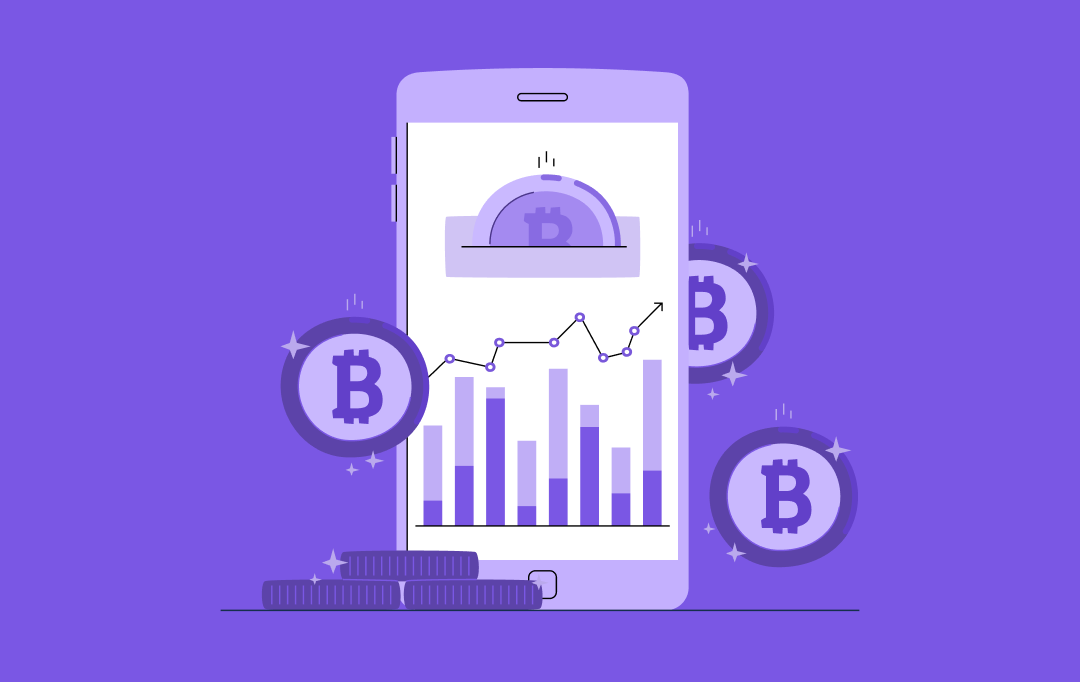
How Much Does It Cost to Build a Crypto Exchange App Like BitOasis in the UAE?
Key takeaways: The cost to build a crypto exchange app in the UAE ranges from $50,000 to $200,000. UAE regulations (VARA and Central Bank) impact development costs due to compliance needs. Advanced features like AI fraud detection increase development costs. The UAE crypto market is expected to grow significantly, offering huge potential. MVP and cross-platform…
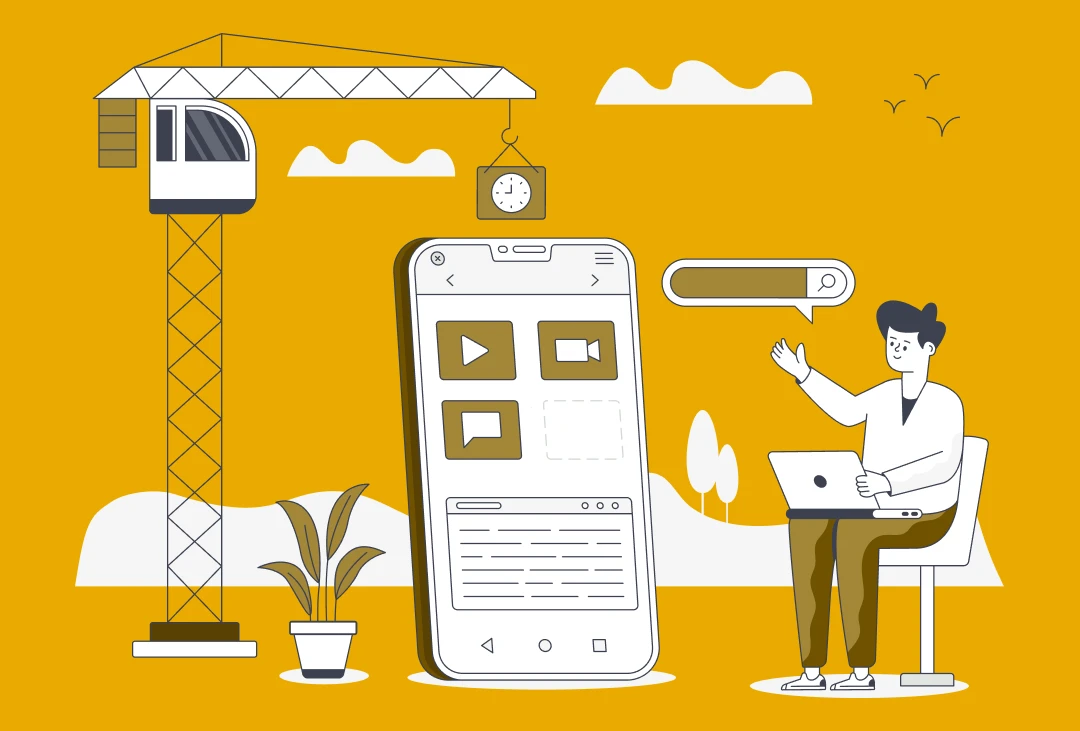
How Much Does It Cost to Build An App Like Kayo Sports in Australia?
Key takeaways: Wide Cost Range: Developing a Kayo Sports-like app in Australia can cost between AUD 45,000 (MVP) and over AUD 750,000 for a full-featured, scalable platform. Feature Complexity Impacts Budget: High-end features, such as multi-view streaming, AI personalization, and multi-device support, significantly increase development costs. Ongoing Hidden Costs: Content licensing, cloud infrastructure, compliance, and…
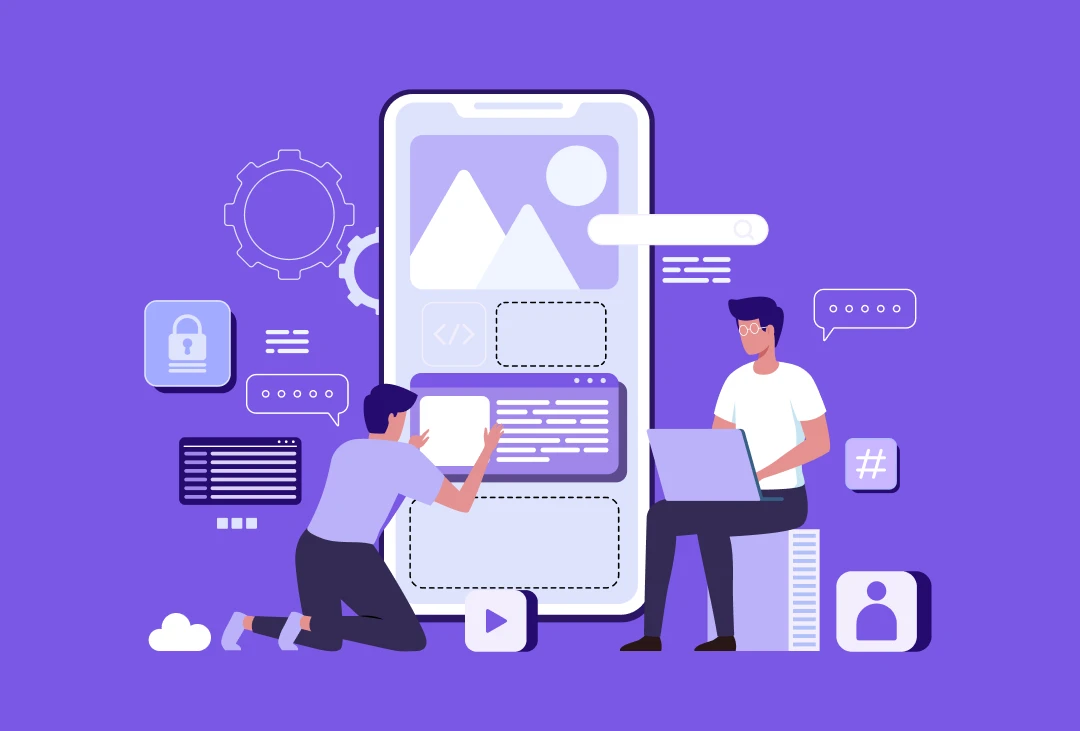
How Much Does It Cost To Build An App in Singapore?
Key takeaways: Mobile app development costs in Singapore range from SGD 40,000 to over SGD 530,000, depending on complexity, platform, and features. Basic apps start at: SGD 40,000. High-end apps using advanced technologies like AI or blockchain can exceed SGD 530,000. Key factors such as platform selection (iOS, Android, Cross-Platform), app complexity (basic, medium, high),…






